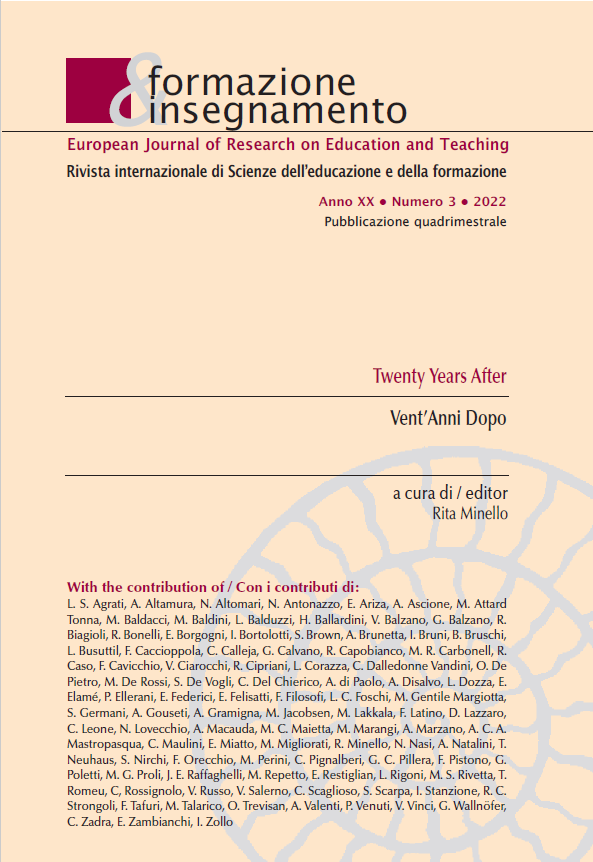Living systems to the test of formation: Von Foerster and the construction of the subject
DOI:
https://doi.org/10.7346/-fei-XX-03-22_06Keywords:
Episemology, Education, Constructivism, CyberneticsAbstract
The intent of this work contribution is proposing a key to interpret, today, the positions of Heinz von Foerster, both for the role of the knowing subject, both for the strategies that support his cybernetics. We want to pay attention both to the enduring formative validity of constructivism in its enhancement of the qualities of the individual, observer, and builder of knowledge and to support for a radical innovation of the discourse on science, with a perspective of the culture of complexity. On this terrain his research intersects with other authors, from Piaget to Bateson, from Ceccato to von Glasersfeld, frequently ignored by "official" science. Von Foerster, coming from the "hard" sciences, felt the need for a new epistemology, open to comparison with other knowledge, like human sciences which, increasingly, during the twentieth century, went in search of their own autonomy of method, a supportive ethics of research.
References
Bachelard, G. (1975). La formazione dello spirito scientifico. In D. Lecourt (Ed.), Epistemologia:Antologia di scritti epistemologici (It. Trans. F. Lo Piparo). Bari: Laterza.
Bruner, J. S. (1966). Verso una teoria dell’istruzione. Roma: Armando.
Bruner, J. S. (1969). Le strutture concettuali della pedagogia moderna. In J. Bruner (Ed.), La sfida pedagogica americana. Roma: Armando.
Bruner, J. S. (1976). Psicologia della conoscenza: Percezione e pensiero. Roma: Armando.
Ceccato, S. (1968). Cibernetica per tutti. Milano: Feltrinelli.
Chalmers, D. (1995). Facing Up to the Problem of Consciousness. Journal of Consciousness Studies, 2(3), 200–219.
Jacob, F. (1988). La statua interiore. Milano: Il Saggiatore.
Jacob, F. (1971). La logica del vivente: Storia dell’ereditarietà. Torino: Einaudi.
Maturana, H. R., & Verden-Zoller, G. (1993). Amor y juego, fundamentos olvidados de lo humano. Santiago de Chile: Instituto de Terapia Cognitiva.
Morin, E. (1974). Il paradigma perduto: Che cos’è la natura umana?. Milano: Bompiani.
Morin, E. (1994). Il metodo (G. Bocchi It. Trans.). Milano: Feltrinelli.
Morin, E. (2020). I ricordi mi vengono incontro. Milano: Raffello Cotina Editore
Munari, A. (1990). Introduzione. In G. Zanarini, Diario di viaggio: Auto-organizzazione e livelli di realtà. Milano: Guerini e Associati.
Piaget, J. (2000). Lo sviluppo mentale del bambino e altri studi di psicologia. Torino: Einaudi.
von Foerster, H. & von Glasersfeld, E. (2001). Come ci si inventa: Storia, buone ragioni ed entusiasmi di due responsabili dell’eresia costruttivistica. Roma: Odradek.
von Foerster, H. (1987). Sistemi che osservano (M. Ceruti e U. Telfener, Eds.). Roma: Astrolabio.
von Foerster, H. (1996). Attraverso gli occhi dell’altro. Milano: Guerini e Associati
von Foerster, H. & Pörksen, B.(2001). La verità è un’invenzione di un bugiardo. Colloqui per gli scettici. Roma: Meltemi.
von Glaserfeld, E. (1999). Il costruttivismo e le sue radici. Amherst (MA): Scientific Reasoning Research Insitute, University of Massachusetts.
von Glasersfeld, E. (2016). Il costruttivismo radicale: Una via per conoscere e apprendere. Roma: Odradek.
Downloads
Published
How to Cite
Issue
Section
License
Copyright (c) 2022 Giorgio Poletti

This work is licensed under a Creative Commons Attribution 4.0 International License.
Formazione & insegnamento is distributed under Attribution 4.0 International (CC BY 4.0).
For further details, please refer to our Repository & Archiving Policy, as well as our Copyright & Licensing Terms.





